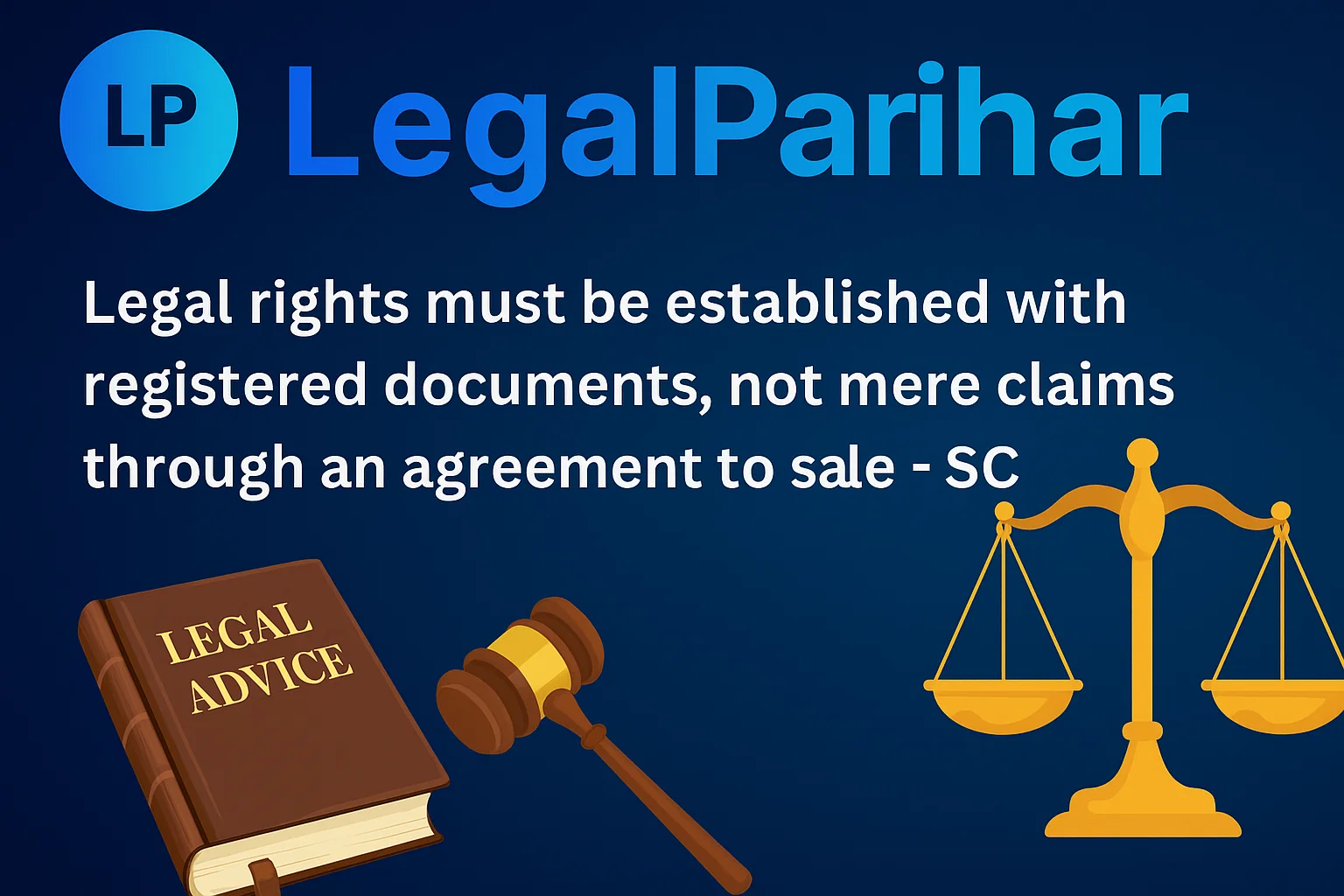Legal Rights - Registered Documents vs Claims
Is It Legally Permissible for a Plaintiff to Seek an Injunction Against a Third Party in Possession Solely on the Basis of an Agreement to Sell?

Case Background
The case centers around the RBANMS Educational Institution, a public charitable trust established in 1873, which has continuously occupied a parcel of land in Bangalore since 1905. Originally leased and later conveyed by the Municipal Commissioner, this land has been dedicated to educational development for economically weaker communities.
In 2018, a group led by B. Gunashekar initiated a lawsuit seeking a permanent injunction against the trust. Their claim was based on an agreement to sell with third parties dated April 10, 2018, alleging a cash advance payment of Rs. 75 lakhs.
Legal Questions Before the Court
The Supreme Court had to determine whether the plaintiff’s claim constituted a valid cause of action and whether it could be dismissed under Order VII Rule 11(a) and (d) of the Code of Civil Procedure (CPC), 1908.
Key legal considerations included:
- -Can an injunction suit be filed against a third party in possession based on a mere agreement to sell?
- -Does an agreement to sell establish any enforceable or actionable right under Indian property law?
- -Should such a plaint be rejected outright as legally non-maintainable?
Supreme Court Verdict
The Court allowed the appeal, reversing the Karnataka High Court and trial court's rulings. The suit was ordered to be dismissed under the provisions of Order VII Rule 11 of the CPC.
>Key Observations:
- -"An agreement to sell does not confer the right of possession."
- -"Without legal standing, plaintiffs cannot sustain claims against third parties."
- -"Absence of ownership rights voids any claim made without a registered sale deed."
Statutory Reference:
- Section 54, Transfer of Property Act, 1882: An agreement to sell does not create any interest in or charge on the property.
- Section 53-A, Doctrine of Part Performance: Applies only against the seller, not third parties.
Key Judicial Precedents:
- Rambhau Namdeo Gajre v. Narayan Bapuji Dhotra: No in rem rights from an agreement to sell.
- Suraj Lamp & Industries v. State of Haryana: Unregistered agreements lack legal enforceability.
- K. Basavarajappa v. Tax Recovery Commissioner: No right to sue third parties without title ownership.
Significance of the Ruling
The decision plays a vital role in discouraging misuse of land litigation. The Court safeguarded a historic public trust from a potentially fraudulent claim, and underscored the need for due process in property transactions.
The Court also:
- Directed authorities to notify the Income Tax Department about suspicious large cash payments.
- Highlighted the potential for punitive damages in misuse of judicial processes.
- Reaffirmed the importance of Order VII Rule 11 CPC to weed out baseless suits at the filing stage.
Legal Takeaways
1. Agreements to Sell Do Not Confer Ownership or Possession Rights
A mere promise to transfer assets through an agreement to sell does not automatically grant any ownership or possession rights. Property law in India requires such agreements to be followed by a registered sale deed. Agreements in the absence of a contract or a registered deed cannot provided possession. It has been the settled position of the Courts that the mere fact that a person has an unexecuted or uncompleted contract will not give him the right to possession.
The lack of procedure is not only administrative; it is an attempt to protect against the possibility of fraud. The requirement for a registration purpose serves a beneficial purpose of protecting against money laundering, benami transactions, and other black market activities disguised using informal ways of property transfer.
2. Claims Asserted Without Formally Written Contracts Contain No Legal Basis
The lack of written and signed documentation to support arrangements, so long a action is for solely on the basis of an agreement, is often viewed by the courts as a challengeable issue. As ruled in Civil Procedure Code Order VII Rule 11, these claims should be dismisses defended at any level as they fail legal cause to action.
An unregistered agreement is often unenforceable and will not stand up to evidentiary requirements. So, they will probably not stand up to any judicial review. Courts have this provision to dismiss speculative, groundless, or abusive lawsuits for the purpose of conserving judicial resources and protecting entitled owners from superfluous litigation.
3. Thorough Real Estate Due Diligence
For buyers, the most accurate and best thorough due diligence before a real estate contract is signing is a best practice. It also includes verifying the seller’s title, checking for liens, verifying municipal approvals, registering numbers, among others. Failure to follow such steps could expose parties to severe legal disputes, financial liabilities, or loss of possession.
Buyers in India, due to the complicated and intricate nature of the property laws, need to seek the advice from lawyers before binding themselves. Accepting informal agreements or relying on oral promises drastically heightens exposure to risk. Transactions that are secure and legally verifiable are more likely to be sustainable in the long term and help strengthen the real estate environment.
Conclusion
The ruling serves not only to RBANMS Educational Institution’s advantage, but also strengthens the call for judicial decorum and legal precision in land cases in disputes. The case helps defend ownership and curtail irresponsible or fraudulent lawsuits.
Disclaimer
This article is for general informational purposes only. It should not be considered legal advice. Always consult a certified legal professional before relying on any legal interpretations provided herein. Legal Parihar bears no responsibility for any actions taken based on this information.